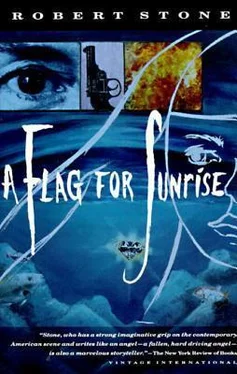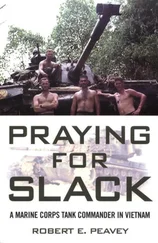Robert Stone - A Flag for Sunrise
Здесь есть возможность читать онлайн «Robert Stone - A Flag for Sunrise» весь текст электронной книги совершенно бесплатно (целиком полную версию без сокращений). В некоторых случаях можно слушать аудио, скачать через торрент в формате fb2 и присутствует краткое содержание. Год выпуска: 2012, Издательство: Vintage, Жанр: Современная проза, на английском языке. Описание произведения, (предисловие) а так же отзывы посетителей доступны на портале библиотеки ЛибКат.
- Название:A Flag for Sunrise
- Автор:
- Издательство:Vintage
- Жанр:
- Год:2012
- ISBN:нет данных
- Рейтинг книги:4 / 5. Голосов: 1
-
Избранное:Добавить в избранное
- Отзывы:
-
Ваша оценка:
- 80
- 1
- 2
- 3
- 4
- 5
A Flag for Sunrise: краткое содержание, описание и аннотация
Предлагаем к чтению аннотацию, описание, краткое содержание или предисловие (зависит от того, что написал сам автор книги «A Flag for Sunrise»). Если вы не нашли необходимую информацию о книге — напишите в комментариях, мы постараемся отыскать её.
A Flag for Sunrise — читать онлайн бесплатно полную книгу (весь текст) целиком
Ниже представлен текст книги, разбитый по страницам. Система сохранения места последней прочитанной страницы, позволяет с удобством читать онлайн бесплатно книгу «A Flag for Sunrise», без необходимости каждый раз заново искать на чём Вы остановились. Поставьте закладку, и сможете в любой момент перейти на страницу, на которой закончили чтение.
Интервал:
Закладка:
The two men walked in step, carrying their shoes in their hands. Both of them wore dark suits with dress shirts and ties and as they walked they hummed softly in counterpoint. Passing the pier, perhaps a hundred feet from where Father Egan lay with the stuffed sleeping bag, one of the two stepped out on the pine slats and began to dance. With one hand, he waved the shoes he held in an arc over his head while the other snaked out at a right angle from his body gliding against the background of the moonlit ocean as his knees swayed. With his bare feet, he stamped the wooden surface of the pier to the beat of the barrel drums and at each stomp the water beneath the pier erupted in small bursts of glowing phosphorescence. When he had finished his dance, the man and his companion fell into step again and moved off toward the darkened clapboards of French Harbor.
Egan lay still until they were out of sight, then rose stiffly and hauled the corpse the rest of the way.
The gear shack was kept unlocked, according to the custom of the coast; from a shelf inside he took two heavy fish-head anchors and a coil of wire line. He dropped the anchors and the line into the boat, climbed in and set the outboard in the water. With a final effort, he dragged the sleeping bag off the pier — it fell into the boat at his feet with such force that for a moment he was afraid that it had stove the bottom in. Then he cast off the line and let the movement of the water carry the boat free.
Gritting his teeth, he pulled the cord to prime the engine and — not daring to look behind him — set a course for the outer reef. Five hundred yards from shore, he wheeled north to skirt the first wall of coral — he was grateful for the moonlight now — then turned north again until the boat had cleared the second reef. When he cut the engines, the whaler picked up the swell of open ocean and began to roll back toward the beach. After the second reef, the bottom fell away abruptly; the water beneath his keel was hundreds of fathoms deep.
Wide-eyed, Father Egan forced open the bag’s zipper and dropped both anchors inside, then looped the wire line around both ends of the bag, leaving the rest of the coil in snarled dangling confusion.
A short distance from the boat, two bonito jumped, their bodies glinting silver, avoiding a shark.
He put the light end over first, and then kneeling in the scuppers, with his hands as a scoop he eased the frozen mass of the girl’s body over the side. His great fear had been that the bag would not sink — but it sank quite readily, sliding down under the hull and disappearing utterly with hardly a bubble to mark its descent into darkness. The deck of the boat and the ocean’s surface held no trace of what they had borne a few seconds before.
Father Egan was amazed at the ease with which it had been done. He felt as though he had gained a thoroughly new insight into the processes of the world.
When he started the engine again, an impulse seized him to head for open sea, to let the sunrise find him miles from the mission landing and the coast of the Republic. But he mastered himself and headed the whaler for shore at trolling speed. Once the engine stalled on him, but he got it turning again without much difficulty. As he passed the inshore reef, he began to cry.
As the beach grew nearer, a moment of lucidity and calm hovered before him like a holy apparition and he gripped it desperately. Within the calm moment sounded his own voice, the voice of Christian humanist witness in a vicious world. Somewhere, in some reasonable, wood-paneled overheated room, he heard himself recounting what had happened and explaining it thoroughly. He made his voice repeat the explanation over and over lest it be lost and his reason overthrown.
I buried her myself, Father Egan heard himself explain. Of course, I couldn’t tell anyone.
On the day Holliwell left for Central America, his wife had volunteered to arrange the weekend outing of a brilliant young paranoid. Holliwell’s wife was a Master of Social Work at the state hospital. Before seven, she drove the girls to school and went on to the facility to pick up the paranoid and conduct him home to his nervous parents in the suburbs of Wilmington.
Holliwell finished his packing alone; he and his wife had taken leave of each other during the night. When his bag was locked and standing by the front door, he went into the kitchen and made himself a strong bloody mary. He drank it by the living-room window, looking out at the front yard where his magnolia hung snowbound and his mountain ash stood tortured and skeletal in an envelope of ice.
She was a little bit in love with this one, Holliwell thought — and the man was unquestionably dangerous. But she would almost certainly be all right. She was very sensible.
His plane left from Kennedy the following morning and he planned to pass the day in New York, first lunching with Marty Nolan, then checking into his favorite hotel to see what the evening might bring. He no longer knew anyone who lived in the city. At four or so, he would phone his wife to make sure that everything had gone well.
He finished the first drink and then had another, not bothering with breakfast. By the time he put his suitcase in the back of the Volvo, he was high enough to stop at the smoke shop in town and buy his first pack of cigarettes in a month. Driving to the turnpike, he smoked one cigarette after another.
The road to the pike — like the road his wife would drive to Wilmington — ran through pine forest and swamp. Each time he passed over a culvert, or the frozen course of a creek dividing one stand of pine from another, the picture would come into his mind of his wife lying dead in the woods, her red and white scarf knotted round her neck in a thin line, her bloodied fingers stiffening across a log.
After the turnpike entrance, he hit the radio and in a mile or two WWVA eased down from space, selling lucky crosses and Christian good fortune. Holliwell tuned it in carefully and between commercials heard a singular musical recitation, delivered in up-country dialect, about a young football player.
The youth on the record was his high school’s star quarterback; it was the Big Game against the school in the next hollow and at half time the home team was a couple of touchdowns behind. During the half-time break, the boy disappeared from the locker room and he was late returning for the third quarter.
“Where in the hell you been?” demanded the anxious hometown coach, who was decent but hard. He swore at the boy and shoved him toward the line of scrimmage.
There then commenced an astonishing display of unforgettable schoolboy ball. The kid played like a young man possessed, and the fans in the little country-and-Western town had never seen the like of him. The opposition was devastated, the coach awestruck and penitent. Amid the jubilation outside the showers, he drew the young quarterback quietly aside.
“Coach,” the youth explained, “my father was blind.”
The boy’s father had been blind and for a week had lain upon his deathbed. The boy had been phoning the hospital regularly and during half time had learned of his father’s death.
The coach cleared his throat. How then to explain the spectacle only just witnessed — the sixty-yard touchdown passes, the seventy-yard scoring runs?
“You see, coach,” the boy said quietly, “it’s the first time he’s ever seen me play.”
By the time WWVA faded out, Holliwell was aware of the tears streaming down his face, staining his tie, wetting his moustache and the stub of his cigarette. He eased the Volvo into the next turnoff, and sat, with the motor running, staring through the windshield at a row of green refuse cans until he had stopped sobbing.
So much for morning drinking. An hour and a half from home and he already had an anecdote for his wife, one that would engage her sympathy and attention, one to save for his return home — providing, of course, that both of them returned alive.
Читать дальшеИнтервал:
Закладка:
Похожие книги на «A Flag for Sunrise»
Представляем Вашему вниманию похожие книги на «A Flag for Sunrise» списком для выбора. Мы отобрали схожую по названию и смыслу литературу в надежде предоставить читателям больше вариантов отыскать новые, интересные, ещё непрочитанные произведения.
Обсуждение, отзывы о книге «A Flag for Sunrise» и просто собственные мнения читателей. Оставьте ваши комментарии, напишите, что Вы думаете о произведении, его смысле или главных героях. Укажите что конкретно понравилось, а что нет, и почему Вы так считаете.












